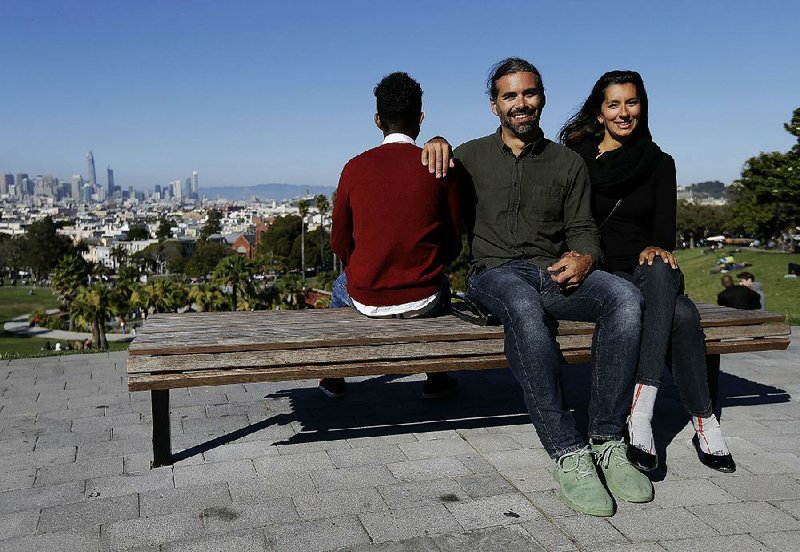SAN FRANCISCO -- Tianna Rooney has already bought the poster board for the sign she'll wave when the 16-year-old refugee boy her family is taking in arrives in the United States. Rooney knows the exact words of welcome she'll write on it, in the teenager's native language from the African country of Eritrea.
But Rooney's family is leaving the sign blank, for now. She and her husband, Todd, fear actually writing the words "Welcome Home" could break her heart.
The foster son they're waiting for is part of a small, 3-decade-old U.S. program for so-called unaccompanied refugee minors that has been halted by a series of new refugee bans and travel limits imposed by President Donald Trump's administration in the name of fighting terrorism.
By blocking the program, the U.S. travel bans have stranded more than 100 refugee children who were already matched to waiting American foster families. Without parents or other adult relatives, those kids are living on their own in countries of temporary refuge, in limbo while their U.S. foster parents hope for a court ruling that will allow the children to finish their journeys.
[PRESIDENT TRUMP: Timeline, appointments, executive orders + guide to actions in first 100 days]
Since the June day a refugee agency matched the Rooneys with their foster son, which turned out to be the same day of the first Supreme Court ruling barring him, "we have experienced this very unexpected ride of grief in our family," says Rooney, a 39-year-old family therapist and mother of two from Brighton, a suburb of Detroit.
Meanwhile, the boy who fled his home country at 13 to avoid widespread forced military conscription of children continues to fend for himself on the streets in his temporary refuge in another African capital, with no phone or Internet for the Rooneys to reach him to explain the delay.
"There's part of me that really hopes he knows a family wants him," Tianna Rooney says.
Since the 1980s, the program for orphaned refugee children has brought in more than 6,000 refugee children, including 203 last year.
[REFUGEES: Map of refugees in Arkansas]
"These are kids on their own, and struggling to survive," said Elizabeth Foydel, policy counsel with the International Refugee Assistance Project, a Washington, D.C., legal-aid group for refugees.
The program for orphaned refugee children from around the world is different from one started by former President Barack Obama's administration in 2014 for Central American children fleeing a surge in violence there.
In the program for unaccompanied refugee children, kids living by themselves in a refugee camp or elsewhere must first come to the attention of a U.N. agency, which may choose to refer them for the U.S. foster program, especially if the children are deemed to be particularly vulnerable. The children must then pass U.S. security screenings and other requirements, and be matched with an American foster family or group home.
But a series of Trump administration orders, and court rulings interpreting them, are now barring refugees with no close family in the United States. That requirement shuts out the refugee children in the foster program, who have no relatives they can turn to anywhere.
The child refugees newly blocked from waiting American foster families include five Ethiopian sisters, ages 9 to 16. The girls lost both parents in 2009, and have faced abuse alone in the war zone of neighboring South Sudan and in Sudanese cities, said Jessica Jones, policy counsel for the Baltimore-based Lutheran Immigration and Refugee Service. Along with the U.S. Conference of Catholic Bishops, the Lutherans are one of two U.S. groups running the program on behalf of the U.S. State Department.
Other waiting children include a 17-year-old couple originally from the Asian country of Burma and the baby they had together in a refugee camp, after fleeing attacks on their Rohingya religious minority in Burma.
Refugee workers say the family faces forced return to Burma if their U.S. arrangements fall through.
In San Francisco, meanwhile, Web designer Julie Rajagopal and husband Mike Gougherty, a senior planner for a regional ferry system, are two of the lucky ones.
The 16-year-old boy they are fostering also fled a lifetime of forced military service in Eritrea, at 13. When he landed in March, a slight youth coming off the plane in an ill-made tracksuit, he was among the last refugee foster children to make it into the U.S.
Meanwhile, in Brighton, Tianna Rooney got out the poster board, thinking to work on the welcome sign. After a concerned look from her husband, she put it away.
"We want to think positive thoughts" that their foster son will come safely, Todd Rooney said. "But without endangering ourselves. Without setting ourselves up for a heartache."
A Section on 07/31/2017
